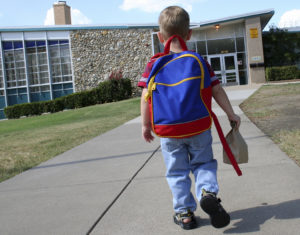Although this topic was not very popular 10, 20 or 30 years ago, more and more family law attorneys are experiencing a differing of opinion when it comes to children’s schooling between ex-spouses. 
It is important to begin by defining a few terms that will help you understand how this article applies to you.
Sole physical custody refers to where the child lives most of the time with the custodial parent, and the other parent has visitation rights (called the non-custodial parent).
Legal custody refers to one parent or both parents, making the important decisions in their child’s life. For example, joint legal custody means both parents must agree on where the child goes to school, religious practices, medical visits, etc. The policy and preference of the state is to allow parents to continue to work together on decisions concerning their children even after divorce.
It is very possible for there to be one parent that has visitation rights but retains joint legal custody. It is equally possible for one parent to have legal and physical custody. It’s important to consult your divorce attorney or child custody attorney to verify your rights.
If you and your spouse are unable to come to an agreement, a judge must review the case and make an order.
Do Your Research
If you are requesting a change in schools, you must do as much research as you can on the new school you are proposing. For your child’s current school and proposed school, find out the different ratings, the student teacher ratio, extracurriculars that each school offers, and anything else that you are able to compare and illustrate to the judge why this new school is in the best interest of your child.
Distance
This is probably one of the more important factors. You will want to track the time and miles from each parent’s home to each school.
One of the factors judges use when making a school choice decision is the amount of time the child will have to spend commuting, as opposed to spending quality time with their parents, working on homework, or participating in healthy activities.
Your child custody attorney will tell you that judges tend to prefer as little commuting time as possible. However, this is not to say it is the only factor, and certainly if the other factors we discuss weight in the new schools favor, a judge may consider this factor less.
Good Faith Reason
Not surprisingly, the reason for the request to move schools should not be asked in bad faith. If a parent decides to move farther away because “they felt like it” and requests the child go to the school nearest their new house, odds are the judge isn’t going for that.
Many times, the school disagreement is between a parent that wants their child to attend a private school, and the other parent wants the child to attend a public school.
Judges do not automatically assume a private school is better than a public school. They will look at the whole picture, including each parent’s ability to pay for a private school, and decide based on that.
Initial Consultation with a Tulsa Child Custody Attorney
Having a child custody attorney will help you gather the correct documents, emphasize points that judges are likely to consider, and walk you through step-by-step so you feel prepared the day of your hearing.
Hiring an experienced child custody attorney will ensure the process is expertly conducted and your interests are well represented.
Contact an experienced Tulsa divorce attorney when you need to go through the Oklahoma relocation process.
For a low-cost confidential consultation, call now: 918-924-5526.
